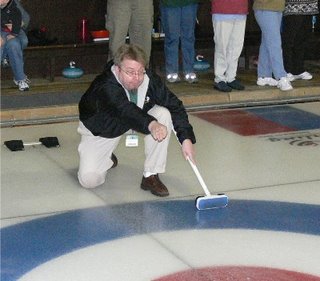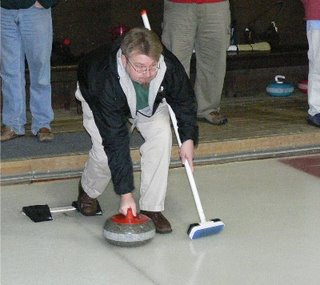I have a slightly different take on a lot of this. I love the Olympics, and I particularly love the Winter Games, sometimes because of the same things the critics carp about. A few thoughts about the just-completed Torino games, in no particular order:
- Obscure Sports: OK, admittedly most Americans don't care about most Winter Olympics sports other than hockey, figure skating, maybe alpine skiing, and the new darling, snowboarding. For most of us, these two weeks every four years are not only the only time we see, but the only time we even think about, sports like ski jumping, cross-country skiing, and speedskating... never mind even more obscure sports like short-track speedskating, biathlon, or curling. Do we care that short-track is the national sport of South Korea, or that biathlon is huge in northern Europe, or that curling is more popular than hockey in Canada? We do not, anymore than we care about how much the rest of the world loves soccer.
But friends, this is a feature, not a bug! If you're any sort of sports fan at all -- or any sort of TV fan -- it should delight you to have spread before you a buffet of something different, in the same way that a literal buffet of new and different foods would. Like exotic foods, some of the Winter Games sports may not be to your taste, and others may be interesting only as an occasional diversion... but their very unusualness is a gift all its own. I probably would never watch most of the Winter Games sports regularly, the way I do baseball or college basketball, but for 2 weeks every 4 years, what's not to love? I'm old enough to remember the early days of ESPN, when it was primarily a sports news network and didn't yet have broadcast rights to many (if any) major sporting events. To fill the time between SportsCenters, they televised a variety of weird and wonderful sports, from hurling and Australian rules football to competitive aerobatics. Even earlier, ABC's Wide World of Sports used to "span the globe" to bring to U.S. TV the "constant variety of sport"... including many of the same "obscure" sports (like skeleton) that now grace the Olympic Winter Games. Sure, it's not steak-and-potatoes sports... but isn't it fun to at least sample some reindeer meat every now and then?
- Medal Counts: Much was made of the U.S. team's poor medal performance, and to be sure there were many U.S. medal hopefuls who failed to reach their potentials... but the key words here are "hopeful" and "potential." In fact, while the popular press was trumpeting hopes of record medal hauls, the more analytical sports press was more realistic: Historically nations experience a significant drop in medal count (on the order of 40 percent) in the Games immediately after they host an Olympiad, and while many U.S. athletes were capable of threatening for medals, fewer were actually predicted to finish on the podium. Take Bode Miller (please!): All the buzz going into the Games was that he might medal in all 5 alpine skiing events... but Sports Illustrated's pre-Games analysis actually only predicted a medal in one event, the alpine combined. Viewed that way, his undeniable collapse seems somewhat less epic.
As it happened, the U.S. finished second in overall medals (with 25, 1 behind Germany's total) and tied for second in gold medals (with 9). It was our second-best performance ever, behind only the home-field Salt Lake City games, and actually better than most countries do right after hosting their own games. The public's perception of a disastrous performance by the U.S. team has much more to do with pre-Games expectations -- which the U.S. Olympic Committee has admitted it mismanaged -- than with objective reality.
- "Ugly American" Athletes: OK, so Bode Miller partied, Lindsay Jacobellis showboated, and Chad Hedrick and Shani Davis spent the whole fortnight glaring at each other. Get over it: Part of the package with world-class athletes is a certain degree of arrogance and self-focus... it's an inherent ingredient of what drives them to be the best. It's extraodinarily rare to find the fierce competitiveness of a world-class champion living side-by-side with selfless altruism in the same human body.
Rare, but not unheard of: For every story like the ones mentioned above, there's a Joey Cheek, who turned over his medal bonuses to charity without even thinking twice... or an Apolo Anton Ohno, who, after seeming somewhat selfish himself in Salt Lake City, apeared to have an almost spiritual appreciation of pure sport this time 'round... or a Lindsay Kildow, who grittily continued to compete despite injuries that made it impossible for her to win... or an Evan Lysacek, who shook off the disappointment of a disastrous short program in men's figure skating to give the performance of his life in the long program and nearly claim a medal... or a Shaun White, whose sheer boyish charm and joy in what he does must have won over even the most curmudgeonly despiser of snowboarding.
In short, I think we Americans have far more to be proud of than to apologize for.
Apparently I'm not alone: The open house drew somewhere between 150 and 200 people, vastly more than the 20 to 40 they expected. The club is planning a 4-session workshop for new curlers, and I can't wait. In the meantime, here I am doing the newbie drills:


Unit of the Day: The mease (scroll down after clicking) is a unit of quantity formerly used by fishermen, equal to the number of herring in a basket (roughly 620). Try working that into a conversation!

